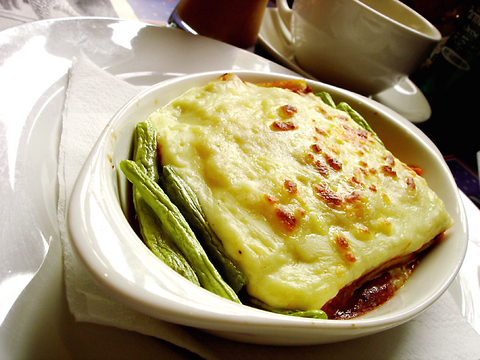I told the staff of Grace, a favorite restaurant by NCCU, that I was going to write them a glowing review, but I don't have the feeling that this is going to end up taped to their window. What makes Grace so special is the impression it gives you of being a space where the pragmatic nastiness of the outside world -- work, dirty dishes, congested traffic, restaurant reviews -- doesn't matter even a bit.
Grace calls itself a "boutique" as well as a restaurant -- although I've never seen anyone shopping there -- and the tiny first floor of is occupied by racks of winter clothes. The one symbol of restauranthood is a stained-wood counter (everything in Grace is pleasantly wooden) with a coffee syphon and a smiling employee who will invite you to go on up to the second floor.
The eating area is bigger, but has the same feel -- like the home of a wonderful grandmother who's forever baking things. Like the view out the windows, the interior is nice but by no means uncomfortably beautiful or gaudy.

PHOTO CREDIT: CHRIS PECHSTEDT, TAIPEI TIMES
Grace's menu is made up mostly of Italian food, including the best spaghetti you can find in the area and real lasagna.
You should probably get the lasagna, but if you don't there's a collection of excellent cheese-topped baked meals in which you have a choice of noodles, rice, penne, or a rice ball with a weird scrambled egg. Sauces include meat sauce, cream sauce, curry, and something that translates loosely as "country vegetable." I can vouch for the first three, but you're on your own as far as the country vegetable goes. There's also Vienna sausage, but to me it tastes suspiciously like hot dogs.
Grace is kind of expensive for the area -- you can easily find a pretty decent meal around NCCU for NT$70 -- but the meals are sets, so before the main course comes a cup of good egg-flower soup and after the meal you get a drink: coffee, kalpis drink (
A warning for the cartographically hopeless: Grace is difficult to find unless you've been there before. The simplest way to find it is to walk on the side of Zhinan Road opposite NCCU and head toward the river. Instead of climbing the stairs to cross the bridge, stay on the sidewalk and pass Revolution House (a coffee shop and bar that's also worth stopping by). Grace is under the beige awning with "Grace" written on it. It's harder to find than it sounds, but the bright side is that you probably won't need to wait for a table.

On April 26, The Lancet published a letter from two doctors at Taichung-based China Medical University Hospital (CMUH) warning that “Taiwan’s Health Care System is on the Brink of Collapse.” The authors said that “Years of policy inaction and mismanagement of resources have led to the National Health Insurance system operating under unsustainable conditions.” The pushback was immediate. Errors in the paper were quickly identified and publicized, to discredit the authors (the hospital apologized). CNA reported that CMUH said the letter described Taiwan in 2021 as having 62 nurses per 10,000 people, when the correct number was 78 nurses per 10,000

As we live longer, our risk of cognitive impairment is increasing. How can we delay the onset of symptoms? Do we have to give up every indulgence or can small changes make a difference? We asked neurologists for tips on how to keep our brains healthy for life. TAKE CARE OF YOUR HEALTH “All of the sensible things that apply to bodily health apply to brain health,” says Suzanne O’Sullivan, a consultant in neurology at the National Hospital for Neurology and Neurosurgery in London, and the author of The Age of Diagnosis. “When you’re 20, you can get away with absolute

May 5 to May 11 What started out as friction between Taiwanese students at Taichung First High School and a Japanese head cook escalated dramatically over the first two weeks of May 1927. It began on April 30 when the cook’s wife knew that lotus starch used in that night’s dinner had rat feces in it, but failed to inform staff until the meal was already prepared. The students believed that her silence was intentional, and filed a complaint. The school’s Japanese administrators sided with the cook’s family, dismissing the students as troublemakers and clamping down on their freedoms — with

As Donald Trump’s executive order in March led to the shuttering of Voice of America (VOA) — the global broadcaster whose roots date back to the fight against Nazi propaganda — he quickly attracted support from figures not used to aligning themselves with any US administration. Trump had ordered the US Agency for Global Media, the federal agency that funds VOA and other groups promoting independent journalism overseas, to be “eliminated to the maximum extent consistent with applicable law.” The decision suddenly halted programming in 49 languages to more than 425 million people. In Moscow, Margarita Simonyan, the hardline editor-in-chief of the